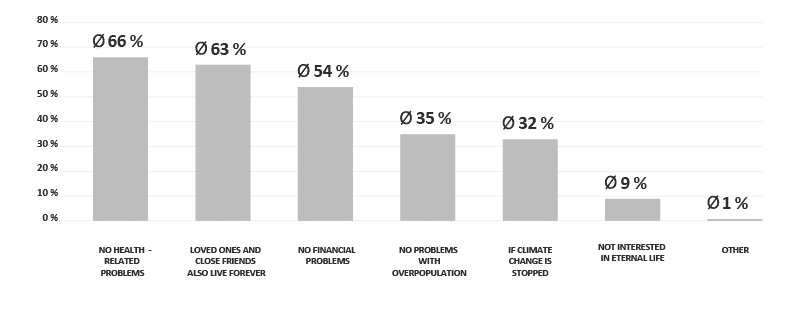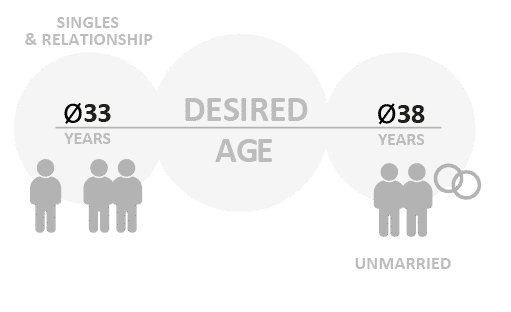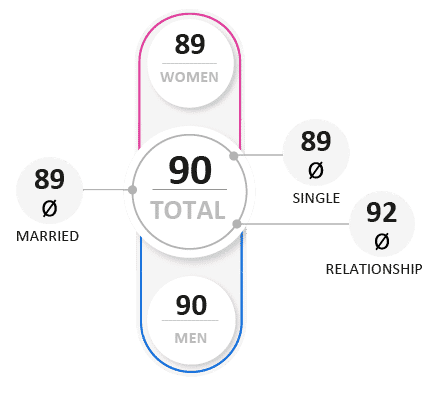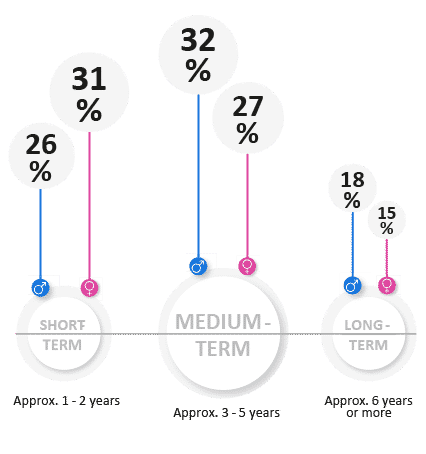Our Resorts
27. April 2022
Eternal life
TRAPPED IN THE HAMSTER WHEEL OR ENDLESS HAPPINESS?
In search of eternal life. What may sound like the abstruse goal of a James Bond villain has always been a pious wish of mankind. To break the temporal boundaries of human existence and to defy nature and its cycle of life, that would be it! Or rather not? Do people really want that and if so, under which conditions?
At Lanserhof, we cannot yet get to the bottom of the source of eternal life. But we can investigate whether people would be willing to live forever at all. What dream age people in Germany would like to reach, what conditions would have to be clarified for them to live forever, how they feel about their actual life expectancy and how far ahead they plan. We asked all this in a representative Appinio survey of 1,000 people from Germany.
Germany wants to live forever –
Climate change not a big fear factor
Eternal life has a bit of the devil about it, making tempting offers but keeping quiet about the cost. The vast majority of respondents are interested in living forever, if the conditions were right. But not at any price! Two thirds of the people would like this only if health problems would never occur. Almost as many would only consider this if their loved ones were also allowed to indulge in timeless life.
The philosophically angehauchte desire for the eternal life is caught up nevertheless fast again by the local reality. Thus scarcely over half indicated to consider eternal life only if never financial concerns would occur. This is quite understandable, because eternal life is unlikely to be equated with eternal working hours.

The evaluation of the question: Under what conditions would eternal life be interesting for you? (Multiple answers possible)
The golden 35 –
Desired age influenced by relationship status
Germany would like to be 35! At least this is what our Appinio survey revealed, with 35 years proving to be the age at which Germans would like to be forever, regardless of gender. But why 35 exactly? Pubertal problems have long since been overcome, one’s own self has been found and accepted, family planning has progressed. The physical state is exactly in a vacuum between gratifying maturation and frustrating aging? All this is just conjecture, but the unanimity here is quite surprising.

The evaluation of the question: If you could live infinitely long, at what age would you like to be (e.g. live in the body of a 20-year-old)? With a focus on the gender of the respondents.
Married people want to be 5 years older than single people

The evaluation of the question: If you could live indefinitely, at what age would you like to be (e.g. live in the body of a 20-year-old)? With a focus on the relationship status of the respondents.
Relationships are not exactly rare elementary prerequisites for subjective happiness on our planet. But in addition to everything they give us (and take away), something even more exciting is now emerging. The Appinio survey data reveals that married people would like to be about 5 years older than single people if they could live forever. They would like to be 38 forever, while single people would prefer to be 33 forever. Does marriage bring us age wisdom that we no longer want to miss?
Divided Germany:
Desired age exceeds life expectancy

The current life expectancy is 78 years for men and 83 years for women. Is that enough for you? With a focus on the gender of the respondents.
We are getting older and older. Thank you medicine! Thank you health education! Thank you health care! And yet we are not getting enough. Men live to an average of 78, while women usually live 5 years longer. Slightly less than half of respondents said they were satisfied with this life expectancy. Despite the lower average age for male participants, as many as 43% of them answered that they were satisfied with the average age. Conversely, however, more than half would like to live longer than the statistics predict.

The evaluation of the question: How old do you want to be? With a focus on the relationship status of the respondents.
If Germans could choose, current life expectancy would not be sufficient after all: the self-imposed average age here is 90. The comparison between singles and people in a relationship is also interesting. Is life alone less worth living? While single people are content with an age of 89, those in a relationship aim for a longer life of up to 92.
Looking ahead:
Men live in the future, women in the now

The evaluation of the question: How far in advance is your life planned? With a focus on the gender of the respondents.
Current global problems show that what was thought to be safe has to be quickly overturned when circumstances demand it. Nevertheless, planning gives us security. The Appinio survey shows that people in Germany tend to look ahead in the short and medium term. The minority (17%) of respondents said they plan their lives over 6 years or even longer. Instead, 31% prefer medium-term planning. The gender distribution is particularly surprising: men seem to be more likely to practice long-term planning. 27% of women said they do not plan their lives at all. In contrast, men can almost be described as long-term life planners: At 32%, around one in three men plan ahead for both the medium and long term (18%).
Are we working ourselves to death? Germany self-critical
The question about reaching the age of one’s dreams yields some surprising results. With regard to their own lifestyle, the majority of respondents are confident that they will reach their dream age with their current lifestyle. A proud 27%, on the other hand, stated that they tend not to be able to reach their desired age with their current lifestyle. Wouldn’t that be an incentive to change something? Unfortunately, the inner pig is not so easy to take for a walk, but prefers to sit on the couch with us.

The data for question: Do you think you will reach your dream age with your current lifestyle?
The data was collected in March 2022 with the help of Appinio. A total of 1,000 people in Germany were interviewed for this representative survey. Six questions were asked, which were answered equally by 500 male and 500 female participants. The data was collected exclusively in Germany and is representative of the entire country. This data collection was compiled to the best of our knowledge and belief, but does not claim to be up-to-date or complete. It is not a scientific study.